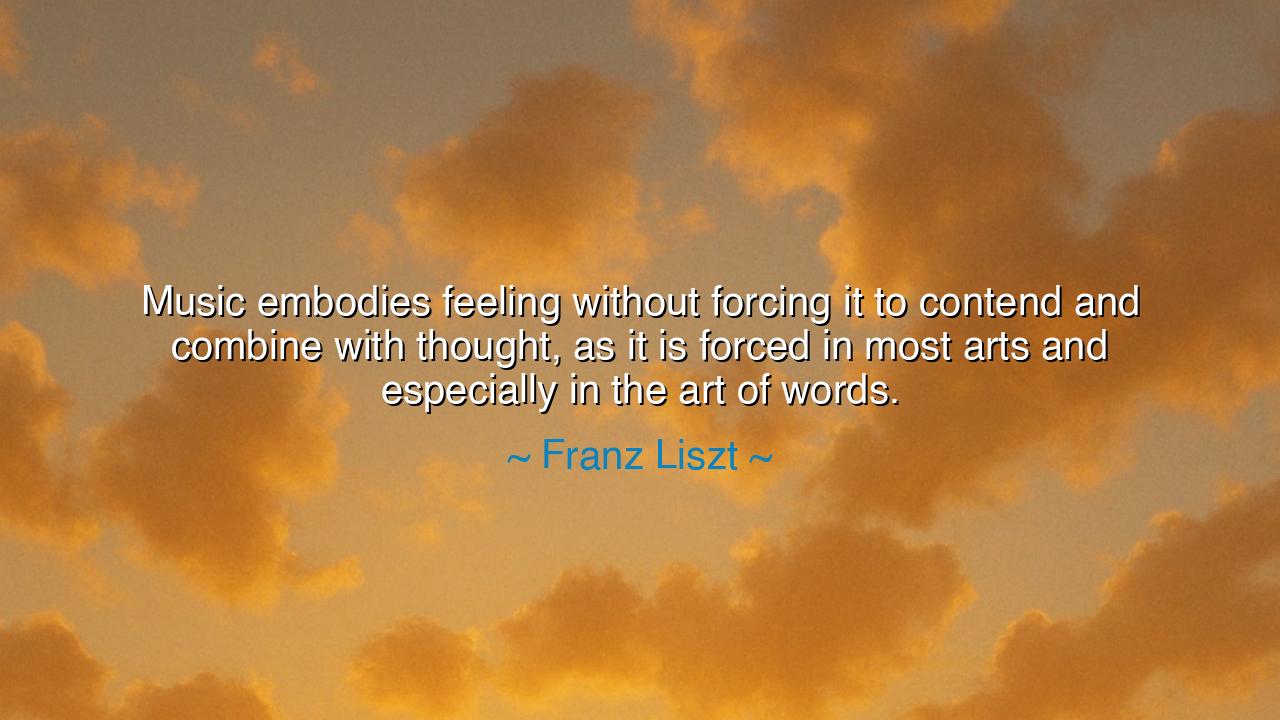
Music embodies feeling without forcing it to contend and combine
Music embodies feeling without forcing it to contend and combine with thought, as it is forced in most arts and especially in the art of words.






Host: The dim light of the evening creates a serene atmosphere, and Jack and Jeeny sit in quiet contemplation, reflecting on Franz Liszt’s words: "Music embodies feeling without forcing it to contend and combine with thought, as it is forced in most arts and especially in the art of words." Jack leans back slightly, his fingers gently drumming on the table, clearly lost in thought. Jeeny, sitting across from him, watches with a quiet understanding.
Jack: (his voice reflective) "Liszt’s quote is fascinating. He’s saying that music can convey feeling directly, without the need to explain or articulate it through words. It bypasses the mind, reaching us on an emotional level that other forms of art, like literature, often can’t. In a way, music speaks to the heart, not the intellect. It’s more about the feeling of it, rather than the meaning."
Jeeny: (nodding, her tone thoughtful) "Exactly. In a way, music allows us to experience emotion without the need for words to explain it. When we listen to music, we’re not dissecting it or trying to understand its meaning—we just feel it. Liszt is drawing a distinction between how music communicates and how other art forms, especially literature, require us to filter the emotion through our thoughts. With music, there’s no middleman; it’s just pure feeling."
Jack: (pausing, his voice curious) "It’s almost like music is a more immediate form of communication. You don’t have to think about it, you just experience it. In literature or visual art, there’s always that process of interpretation—you read the words, look at the image, and then try to make sense of the emotion behind it. But music cuts out that step and speaks directly to our emotional selves."
Jeeny: (smiling softly) "Yes, that’s why music can be so universal. It transcends language, culture, and intellectual barriers. A piece of music can make you feel something deeply without you needing to understand why or analyze it. There’s something about the way music allows us to access emotion directly that makes it so powerful. It’s a pure form of expression."
Host: The stillness in the room deepens as Jack and Jeeny reflect on Liszt’s insight into the emotional power of music. The quote has revealed a deeper understanding of the way art communicates with us, and how music, in its simplicity, speaks directly to the heart.
Jack: (his voice softer, more reflective) "It makes me think about how much we complicate things with words. So often, we try to explain feelings, to break them down and understand them, but with music, you don’t need to. The emotion is just there, unfiltered, unspoken. It’s like music doesn’t require explanation—it just exists, and we connect with it."
Jeeny: (nodding thoughtfully) "Exactly. Music can bring us together without needing to explain itself. It doesn’t force us to interpret or analyze—it just allows us to feel. And in that way, it’s a more immediate and honest form of expression. It’s pure emotion, and it speaks directly to who we are."
Host: The conversation settles into a quiet understanding between them. Liszt’s words offer a reminder of the power of music to communicate the inexpressible, to convey feeling without the need for words or analysis. The night outside has deepened, but the warmth of their thoughts about music and emotion lingers, creating a deeper appreciation for the ways that art speaks to the heart.






AAdministratorAdministrator
Welcome, honored guests. Please leave a comment, we will respond soon